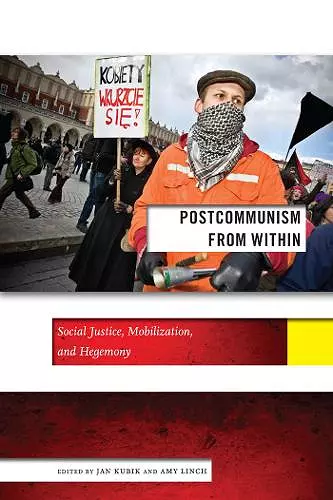Postcommunism from Within
Social Justice, Mobilization, and Hegemony
Jan Kubik editor Amy Linch editor
Format:Hardback
Publisher:New York University Press
Published:26th Aug '13
Currently unavailable, and unfortunately no date known when it will be back

While the decline of communism in the late twentieth century brought democracy, political freedom, and better economic prospects for many people, it also produced massive social dislocation and engendered social problems that were far less pronounced under the old regimes. The fall of state socialism led to enormously complex political, economic, social, and cultural transformations, and while political liberalization was a lofty goal, it was neither uniform in its effects nor unqualified in its benefits. Postcommunism from Within foregrounds the diversity of the historical experiences and current realities of people in the postcommunist region in examining how they are responding to these monumental changes at home.
The original essays in this volume lay out a bold new approach to research on the postcommunist region, and to democratization studies more broadly, that focuses on the social and cultural microprocesses behind political and economic transformation. Thematic essays by eminent scholars of postcommunism from across the social sciences are supported by case studies to demonstrate the limitations of current democratization paradigms and suggest ways of building categories of research that more closely capture the role of vernacular knowledge in demanding, creating, and adapting to institutional change. A novel approach to understanding one of the greatest political and social transformations in recent history, Postcommunism from Within explores not just how citizens respond to political and economic restructuring engineered at the top but also how people enact their own visions of life, politics, and justice by responding to daily challenges.
"This book is an excellent collection of research which shows the gaps in understanding that have emerged from studying post-communist states and societies from above and from the perspective of taken-for-granted concepts, such as the neat separation of public and private spheres. Rather the contributors illustrate the need to disaggregate the concepts that have been used to understand post-communist problems and to disaggregate, as researchers, our own approaches and assumptions." * Europe-Asia Studies *
"This is a much-needed collection. Studies of the political and economic transformation of the postcommunist countries have focused on the role of the state and market, obscuring both a full consideration of the role of society and the impact of change on society. Such a bottom-up perspective is necessary to understand the phenomenon of postcommunism. In bringing together a series of essays on focused gender, poverty, and corruption the book is a must for anyone who wants to develop a multifaceted and nuanced understanding of the far-reaching changes of the past two decades." -- Michael Bernhard,Raymond and Miriam Ehrlich Chair, Department of Political Science, University of Florida
"This is a much-needed book that charts a new path in studying postcommunist societies. Jan Kubik, Amy Linch, and their collaborators propose an original, multidisciplinary approach that challenges standard modes of analyzing transformations in Central and Eastern Europe. This approach, calling for careful and context-sensitive empirical research, recognizes the diversity of experiences and outcomes in the region and offers conceptual tools to understand vastly dissimilar societies and cultures undergoing massive political, social, and economic transformations. For anyone concerned with patterns of postcommunist transformation, this is a must read." -- Grzegorz Ekiert,Professor of Government and Director of the Minda de Gunzburg Center for European Studies, Harvard U
ISBN: 9780814724262
Dimensions: unknown
Weight: 748g
453 pages